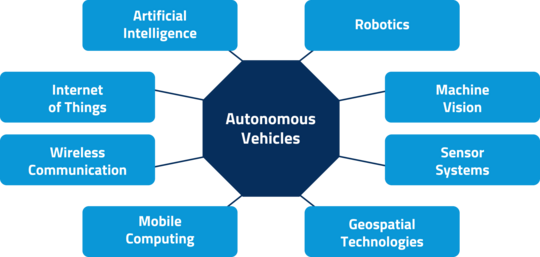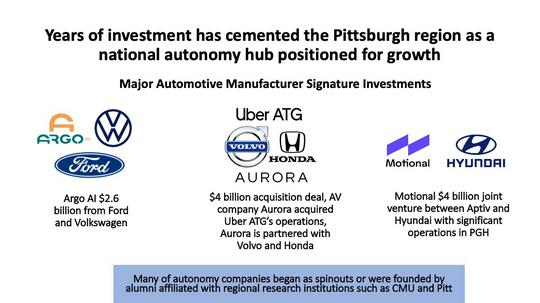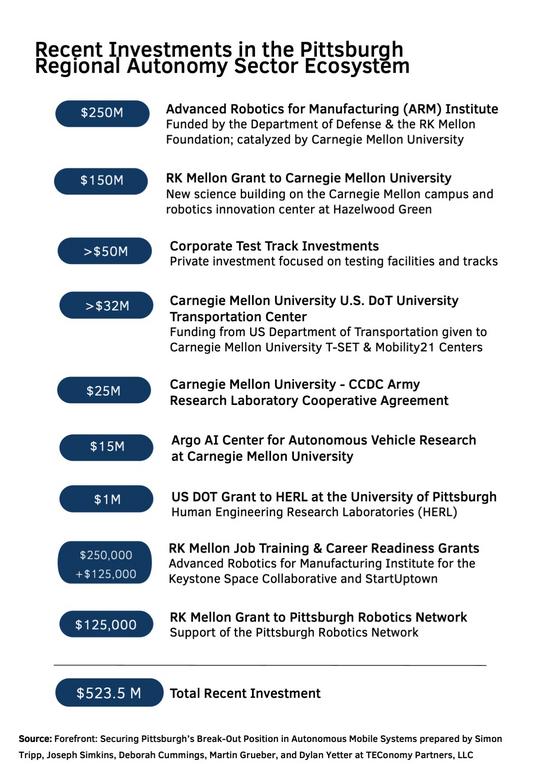
A recent report naming Pittsburgh as seventh in the U.S. in the creation of autonomous technology businesses (including such things as robotics, artificial intelligence and smart systems) and second in its concentration of market leaders has given new momentum to the region’s drive toward national leadership in the autonomy industry.

The estimated direct employment footprint of Pittsburgh’s autonomy sector already totals over 6,300 jobs, which provide an estimated $651 million in labor income, $34.7 million in state and local tax revenues and $126.7 million in federal tax revenues — with the potential to grow exponentially if the region executes on a strong plan laid out by research firm TEConomy in its recent report.
TEConomy points to evidence that “the regional ecosystem has reached an inflection point in developing a focus on mobile autonomous systems . . . that can serve as an economic development engine beyond supporting continued excellence in R&D. The strength of the academic research community in this regard is evidenced by the large-scale federal research funding coming to Pittsburgh to support robotics and associated fields.”
Around $10.6 billion in private investment has been directed to the Pittsburgh autonomy sector in the past few years, plus more than $523 million in recent investment, for a grand total of $11 billion.


This new push for statewide coordination of a multi-faceted program to facilitate the next stage of the industry’s growth — moving from R&D to manufacturing and deployment — is being led by regional leaders including Regional Industrial Development Corporation (RIDC), Greater Pittsburgh Chamber of Commerce, Carnegie Mellon University (CMU) and many of the nationally known autonomy companies that already make Pittsburgh their home. Carnegie Mellon University, in particular, has been a major force in building the autonomous technology industry in the Pittsburgh region, with many of the talented individuals and innovative companies originating with a connection to CMU.
Bringing the industry together to advocate for a focused approach to government investment and priorities, as well as legislative and regulatory initiatives, will assure that state and local officials are hearing directly about the industry’s needs. Companies including Aurora, Argo AI, Aethon, Carnegie Robotics, Caterpillar, Locomation, Motional, Seegrid, Near Earth Autonomy, Thoro.ai, and many others, including the Pittsburgh Robotics Network have been participating in this effort.
The group’s activities in Pittsburgh are part of a coordinated, regional approach that recognizes and addresses the real-world needs of the industry. Industry leaders — the people who build companies and create jobs — are providing valuable input on what they need and, together with other stakeholders, are bringing to bear the resources and perspective of government, universities, foundations and communities — all important institutions in our region and all with their own points of view. Together, they are focused on the strengths, challenges and opportunities presented by this industry and working collaboratively to make the vision of economic growth a reality for the region.
That plan involves enhancing coordination of the region’s innovation ecosystem assets; further development of the regional autonomous industry supply chain to capture future manufacturing opportunities and jobs; expansion of the talent pipeline, which is already being driven by CMU, the University of Pittsburgh and the region’s many other universities; adoption of autonomous technology and products by government agencies; and support for infrastructure investments that will enable companies to test and develop their products locally.
RIDC President Donald F. Smith, Jr. notes that “we’re working on closing the commercialization cycle — leveraging our global leadership in technology to deepen the manufacturing and distribution of end-user products and services here, too. We are a region that has throughout our history been a place that makes things, just like we did for steel. And we’re moving forward by working collaboratively with a coordinated regional plan.”
Smith also pointed to another unique asset for the region: the existence of property in communities surrounding Pittsburgh that provide opportunities for construction of the type of large facilities autonomous companies will need as they grow. Many of these properties — often former steel mills or obsolete industrial parks — are already being redeveloped, with RIDC’s Mill 19 being just one recent example. Many others, located within commuting distance of the city, present additional opportunities.
The Pittsburgh region, which fueled economic expansion when steel was building the country’s industrial might, is now poised to fuel a new era of growth as new technologies revolutionize the way we live and work.
Check out RIDC Mill 19, a revitalized Pittsburgh steel mill that’s become home to several leading autonomy and robotics institutions. The autonomy sector is rapidly growing in southwestern Pennsylvania, poising the region to take the lead as a global industry player. Are you here?
For more autonomy insights, see RIDC’s content hub: Pittsburgh’s Autonomy Economy.
The mission of the Regional Industrial Development Corporation is to catalyze and support economic growth and high-quality job creation through real estate development and finance of projects that advance the public interest. A not-for-profit entity, RIDC has developed over 2,800 acres in 12 industrial parks and manages over 40 buildings.
